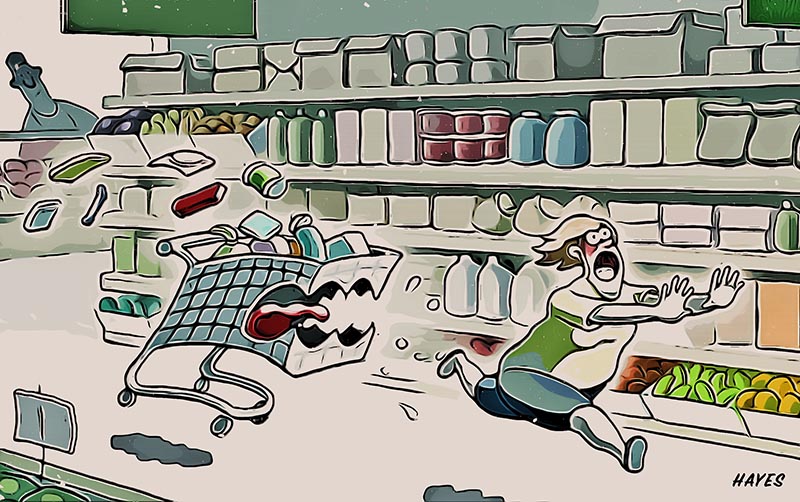
Big profits for ‘Coles-Worth’
on your grocery bills
Amid the accusations of price gouging by the big two supermarket chains, Coles and Woolworths cry foul and claim that it’s all down to increased operating costs. Yet, not surprisingly, last financial year they returned bumper profits of $1.1 billion and $1.62 billion respectively for the full financial year.

28 February 2024
ALAN HAYES
COASTIES are struggling with the cost of living crisis, yet are they getting a fair deal during the cost of living crisis?
According to a recent ABC Four Corners story, leaked emails confirmed that Coles has employed tactics to price-gouge to take advantage of inflation. And while Woolworths claim their hands are clean, an industry insider revealed that Woolworths has used similar tactics to increase its profits over the last 18 months.
The leaked emails show how supermarkets can exploit this lack of competition, leading to higher grocery bills – they’ve been doing so for their own benefit, which means they’ve been screwing over customers.
Coles CEO Leah Weckert has rejected accusations that the supermarket’s actions amount to price-gouging and Woolworths CEO Brad Banducci has denied Woolworths supermarket used these dirty tactics, despite the fact that its profits increased from 5.3% to 6%, while its cost of doing business remained stable.
Yet despite the supermarket price-gouging denials, Woolworths' chief executive, Brad Banducci, has resigned after almost nine years heading Australia's biggest supermarket chain, as political pressure mounts over the company's expanding profits at the same time as shoppers grapple with fast-rising grocery prices. He resigned just a day after he walked out of a disastrous TV interview.
Is price gouging illegal in Australia?
While it's often seen as unfair, prices or price increases that people may think are too high are not illegal on their own. However, it's illegal for businesses to make false or misleading claims about prices, including the reason for price increases.
The problem is that the Coles-Worth duopoly, who rarely compete on price, control approximately 65 per cent of the grocery market.
So, while this practice continues, customers are being screwed at the checkout, even though the ACCC’s recent inquiry ‘into the competitiveness of retain prices for standard groceries’ did not identify anything that is fundamentally wrong with the grocery supply chain. Evidence provided to the inquiry did not support the proposition that retail prices have risen while farm-gate prices have stagnated or declined.
Yet Australian farmers are still accusing Coles and Woolworths of screwing them for fruits and vegetables, claiming supermarkets profit too much from their crops.
A recent survey by AUSVEG (the peak industry body for the Australian vegetable and potato industries) found 34% of vegetable growers are considering leaving the industry in the next 12 months as they struggle to turn a profit.
Too much power, suspect pricing, and loopholes in government policy
There’s no doubt that Coles-Worth supermarket prices are ever increasing, and that the total of checkout docket has become a financial shock for many, as everyday Australians struggle to put food on the table. So, what does the Coles slogan "down, down, prices are down" and the Woolworths slogan "Get Your Woolies Worth" really mean?
My wife buys a few items from both supermarkets but because we have maintained a sustainable lifestyle, we eat seasonally from the produce harvested from our vegetable garden and from a wide variety of different fruit trees. We also make most of our own household products from easy to obtain, inexpensive ingredients – yet those items that she does buy, despite the grocery docket telling her she has saved $60, or sometimes less, the total of the shop is still more expensive than previously, even though she was still purchasing the same items.
My wife observed that those items on the cash register docket that were alleged to be ‘specials’ were more expensive than when previously purchased and that she had never seen them sold at the price that was now being claimed as the price prior to discounting.
"It would seem that the discounts are not really discounts at all," she said.
"A packet of 100 serviettes was 95 cents one week, then jumped up to 3 dollars the following week. How can you justify that!"
A number of years ago, a jewellery store chain was caught out price-gouging by inflating prices before applying an alleged discount. It was found that the discounted items had never been sold at the claimed price, so the discount was bogus – it was just a ruse to encourage people to buy, thinking that they were receiving a substantial discount. The business was fined, yet the practice still continues, throughout retail, which includes supermarkets, because of loopholes in legislation.
The Federal Government's role
Earlier this year the Albanese Government formally issued a direction to the Australian Competition and Consumer Commission (ACCC) to investigate pricing and competition in the supermarket sector to ensure Australians are paying a fair price for their groceries.
“My government is concerned about the price of what consumers pay at Coles and Woolies and other supermarkets,” Anthony Albanese said.
A spokesperson for the ACCC said “For some time now, we have been closely considering the reports received from consumers alleging false or misleading ‘was/now’ or other pricing ‘specials’ advertising by supermarkets, and whether they may raise concerns under the [Australian consumer law]."
Anthony Albanese offered to give the competition watchdog extra powers to combat price gouging, after comments from the regulator suggesting it could sue grocery giants for deceptive special discounts. But nothing happened, except a feeble report that does nothing more than pay lip service at the detriment of the consumer and to the benefit of the Coles-Worth duopoly to maintain their high profits.
The Federal Government’s answer to the ACCC’s findings were:
- refer the anti-competitive impacts of state and local zoning and planning laws to the Council of Australian Governments (COAG);
- the Government will consider the best way to introduce a mandatory nationally-consistent unit pricing regime. Issues such as the product range that’s captured and store size will need to be worked through in consultation with industry to ensure compliance costs are kept to a minimum;
- the Minister for Agriculture will work together with the horticultural industry through the Horticulture Code Committee to carefully consider the ACCC’s 13 recommendations to enhance the operation of the Horticulture Code of Conduct (which regulates trade in horticulture produce between growers and traders and provides dispute resolution procedures); and
- the Government will implement a creeping acquisition law ( i.e. acquisition by the large chains of smaller competitors over time), releasing a discussion paper by the end of August.
The Government has also set up the GROCERYchoice website that gives consumers a snapshot of local grocery prices.
But is this enough, or is still nothing more than 'a whitewash'? People are still struggling with higher prices at the supermarket checkout and many people are buying and eating less to keep up with their bills amid the stratospheric rises in grocery prices. To help combat the problem, more people are bulk buying with friends from food co operatives and farmer’s markets and the disadvantaged, whose cupboards are almost bare, are able to purchase food from crisis centres, such as Mary Macs in Gosford – but crisis centres depend on donations so that they can help the needy, which they are now struggling to get.
What can you do to beat the rising prices?
The only way to beat the supermarket gouge is to start growing your own food – it doesn’t matter how big a back yard you have, or even if you live in a unit, you can grow in containers, up trellises or even on a balcony. Making you own household products, which is easy too, will also save you money - whether it’s something as simple as an air freshener spray, which can also be used as an antiseptic disinfectant for wiping over kitchen and bathroom surfaces as well, to making a clothes washing gel that is kind on your washing machine, your clothes and the environment. A bottle of eucalyptus oil, a bottle of white vinegar, a bottle of methylated spirits and a packet of bicarbonate of soda will take care of almost all of your cleaning needs.
While you’ll pay from between $2.70, for a supermarket brand air fresher spray, and $8.00 for a brand name, you can make your own product, over a long period time once you have the basic ingredients, for just a few cents. All you’ll need is eucalyptus oil, or any other pure essential oil you fancy, methylated spirits and water – dissolve a few drops of the oil (depending upon how strong you want the fragrance to be) in 10 millilitres of methylated spirits, then mix it with half-a-litre of water in a pump spray bottle. Use on a fine mist spray to perfume the air or when wiping over kitchen and bathroom surfaces.
If you search online and can find a secondhand copy of the ‘It’s So Natural Household Companion’ – it’s now out of print but is being release again as a vegan-friendly edition prior to this coming Christmas – it will guide you through a sustainable and inexpensive way to combat the ever-increasing cost of living.
Back to the government and who is benefiting from supermarket super profits
Surging profits at Coles and Woolworths is bad news for everyone, except shareholders, of course. Here's a list of happy faces in Parliament who, according to Open Politics, have shares in one or both of the duopoly supermarket giants.
The Nationals’ David Gillespie has shares in Coles and Woolworths, as does Labor’s Graham Perrett. Also, in the ALP, newbie Higgins MP Michelle Ananda-Rajah has shares in Woolworths in the sprawling self-managed super fund she shares jointly with her partner; Holt MP Cassandra Fernando and Canberra MP Alicia Payne have just Woolworths in their relatively modest declarations, as does Tony Zappia. Liberal Senator Paul Scarr has shares only in Coles, and the LNP’s Ted O’Brien just in Woolworths.
On top of that, the partners of ALP Social Services Minister Amanda Rishworth, Nationals MPs Barnaby Joyce and Anne Webster, independent MP Helen Haines and the ALP’s Ged Kearney, Kate Thwaites and Mike Freelander all have shares in one or more of the duopoly.
No wonder their faces are smiling!








.jpg?crc=4257584689)










_web.jpg?crc=282450513)



